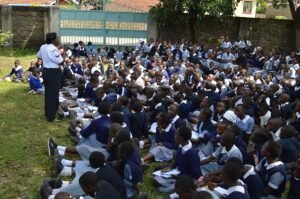
Women Leaders during the International Women Day 2024 commemorated in Kuresoi South,Nakuru County
Francis Waiganjo, a respected figure from Rubiri in the Karagita area of Naivasha Sub County, holds significant roles in his community.
He is a Nyumba Kumi Committee member and a Community Health Promoter, demonstrating his deep involvement and commitment to community health.
His expertise in mental health is further enhanced by his training from MIDRIFT HURINET on Psychological First Aid, a testament to his dedication and preparedness in dealing with such concerns.
With these accolades, he facilitates community interests. He ensures that those with no immediate solution are referred to the appropriate channels, demonstrating his resourcefulness and commitment to finding solutions.
He shared how he uses his role to reinforce Mental Health intervention in his community.
“A case was referred to me by my area Chief.
A young man and her wife were deep into alcoholism, which had strained their relations.
This was compounded by Mental Health issues brought about by harsh economic conditions.
I contacted their respective families,then to them, and later, I referred the matter back to the Chief.
Most community members are casual flower farm workers suffering from power imbalances in their relationships.
While their hands toil to produce beauty that graces far-off lands, their lives are marred by challenges that weigh heavily on their minds and hearts.
Long hours under grueling conditions take a physical toll, but the deeper wounds are often invisible. Many workers face job insecurity, knowing their income is contingent on fluctuating demands and the whims of global markets.
This uncertainty fosters anxiety as they struggle to provide for their families, with no safety net to catch them when work is scarce.
The working conditions compound the problem. Exposure to harsh chemicals, inadequate protective gear, and limited access to health services leave them vulnerable not just physically but emotionally as well. Many find themselves grappling with feelings of helplessness and worthlessness, their identities reduced to the repetitive tasks they perform.
The stigma surrounding mental health in the community only deepens the silence, leaving workers to bear their burdens alone.
These challenges ripple outwards, straining family relationships and eroding social bonds as frustration and despair build unchecked.
For the casual laborers and flower farm workers of Karagita, the fight is not just for a better wage or fairer treatment—it is a battle to reclaim their dignity, well-being, and peace of mind in a system that too often overlooks their humanity.
Their resilience and determination are truly inspiring.”
Beatrice Mugo echoed his remarks, underscoring the importance of the cordial relationship between the Nyumba Kumi, Chiefs, and Community Health Promoters.
This initiative is a vital force for change and a source of reassurance for the community.
She was also referred to a case by the Chief through the Nyumba Kumi in which a woman suffered sharp cut wounds inflicted by her husband.
After ensuring the woman had received medical attention, she facilitated reporting the incident to the Police Station and further referred the situation to a PM+ helper.
She added, “Nyumba Kumi has become a vital force for change.
This grassroots initiative, built on trust and collaboration, has embraced a proactive role in addressing mental health challenges that often remain hidden behind closed doors.
By liaising with community health promoters, Nyumba Kumi transforms neighborhoods into networks of care, where no struggle is too small to notice and no person is left to face their battles alone. Together, they identify individuals who may be silently suffering, ensuring early interventions before mental health issues spiral into crises.
Community health promoters bring a wealth of knowledge and compassionate expertise, bridging the gap between professional mental health resources and the profoundly personal understanding that comes from living within the community.
Through these collaborations, Nyumba Kumi members are informed to recognize the subtle signs of mental distress and empowered to respond with empathy, guiding those in need toward helpful resources.
From organizing mental health awareness forums to establishing safe spaces for conversations, the partnership fosters an environment where seeking help is not only accepted but encouraged.
This alliance also builds resilience within the community, dismantling the stigma surrounding mental health by normalizing discussions about it at the grassroots level.
Together, Nyumba Kumi, through the Chief and Community Health Promoters, weaves a safety net of support, creating neighborhoods where everyone knows they are seen, heard, and valued.
It is a testament to the power of unity and the profound impact of addressing mental health as a collective responsibility, transforming communities into sanctuaries of healing and hope.”
Naomi Chege from Sanctuary, also in Karagita, highlighted the risk factors in the informal settlements that exacerbate GBV.
She also got referred to a situation by the Chief through the Nyumba Kumi in which a woman wanted to burn her family in the house due to Mental health issues.
“In Karagita, Poverty clings to families like a persistent shadow, forcing many women into economic dependence on abusive partners, unable to escape for fear of losing their only means of survival.
The overcrowded living conditions create a breeding ground for tension, with personal space sacrificed to the unrelenting sprawl of makeshift
homes.
Unemployment, particularly among men, fuels frustration and hopelessness, emotions too often expressed through violence.
The pervasive grip of alcohol and drug abuse further clouds judgment, turning domestic disputes into dangerous altercations.
Cultural norms steeped in patriarchy normalize abuse, silencing survivors with shame and stigma. At the same time, weak legal systems and inaccessible support services leave them trapped in a cycle of fear and helplessness.
In Karagita, the bright laughter of children and the determination of its residents coexist with the unspoken struggles of those battling the invisible chains of GBV, a testament to the urgent need for collective action and change.” She added
By:Jacob Karani




